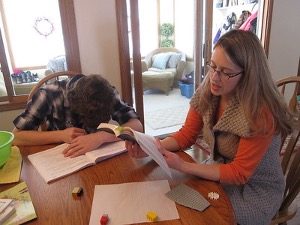While her neighbors rush down the street to catch the school bus, 14-year-old Lilah Hadden starts her school day at home. After spending the morning on math and creative writing with her mother, she takes a violin class online, finishing her day with independent reading. For two years now, homeschooling has worked well for her. “I’m getting to … learn more of what I actually want to learn about,” Lilah says, noting that she’s particularly passionate about music. But if it weren’t for the pandemic, the idea to school at home would never have crossed her mind.
Covid-19 forced students around the globe to learn without physically going to school, as entire states and countries went through long periods of lockdown. It’s sparked new interest in homeschooling alternatives in places ranging from Des Moines, Iowa, to Hamburg, Germany, where homeschooling has been banned for over a century. Students have discovered that alternative school arrangements can offer more flexibility to manage differences, pandemic stress, and distractions.

Homeschooling increased significantly during the pandemic in the United States, rising from 5.4% of households in April 2020 to 11.1% by September of that year. Students like Lilah have found the flexibility of learning surprisingly appealing. However, that same option doesn’t exist in many other countries. In the European Union, it’s illegal to homeschool in Germany, the Netherlands, and Spain. Sweden’s regulations are so strict that it amounts to a ban there, too. But just as in the U.S., many students in these countries have become interested in such alternatives. Partly as a result of the pandemic, groups are now joining forces to fight for fewer restrictions.
In Germany, homeschooling has been illegal since 1919, enforced through hefty fines and even police raids. As a result, it’s estimated that fewer than 1,000 German families choose to teach their kids at home in a normal year. Alina, a 16-year-old German student, really enjoyed online learning during the pandemic, which created an environment similar to that of homeschooling. “I could concentrate much better than in class,” she said. “I could work much more efficiently.”
As a result, she believes that homeschooling comes with a lot of benefits, many of which cannot be provided in a regular school setting. Studying at home is more flexible and can promote independence, organization, and self-motivation. Parents have an easier time accounting for students’ preferences and capabilities, adapting the teaching methods, and prioritizing strengths and weaknesses.
From wanting to travel the world to being dissatisfied with negative environments at schools to prioritizing religious beliefs, an increasing number of parents in the U.S. are opting to teach their kids at home. Homeschooling can also benefit students with special needs, who make up 38% of the homeschooled population in the U.S. according to the National Special Education Advocacy Group. “If you’re sending a kid with dyslexia and dysgraphia and dyscalculia to school, [they might] get really frustrated,” Lilah noted. “If they can be in homeschool, that’s going to help a lot more because they’re getting the help they need, and they can learn at their own pace.”
So why is homeschooling in Germany illegal in the first place? The responsible authorities say they focus on the well-being of the children and want to give every child equal educational opportunities. When the homeschooling ban went into effect, the German economy was still dependent on farming, and many families relied on their children for additional labor. Farm children would, therefore, often be kept at home and could not visit school, preventing them from getting an education like the children of rich families. A ban on home schooling also allowed students with different social backgrounds to mix in classes.
Another point against the legalization of homeschooling is the increase of domestic violence in Germany during the pandemic. Some teachers in Germany even gave students special codes to alert them in case of domestic violence. According to an article in the Freisinnige Zeitung, children should not be solely educated by their parents because it would allow parents to indoctrinate their children with their own beliefs and ideologies, isolating them from society.
While the pandemic brought chaos to education systems worldwide, it has also enabled new perspectives on homeschooling. As a result, momentum is shifting away from Germany’s strict policies. To put this development into action, organizations such as Carpe Diem, a private, state-accredited school founded in 2003, are offering online classes for German students, arguing that factors like social anxiety or exceptional talent in sports or music could prevent them from attending public schools. Others, such as parent-lobbying group Elternlobby, have started petitions since the onset of the pandemic to legalize homeschooling. And some families are fighting back against the government. The case of the Wunderlich family from the state of Hesse, which claimed that the German law violated their basic human rights, went all the way to the European Court of Human Rights, but the court ruled in favor of Germany.
As schools have returned to in-person instruction in the U.S., meanwhile, the decision to learn from home will be left to individuals. Students like Lilah face a difficult decision on whether or not to return to school. While the U.S. and Germany have gone their separate ways on homeschooling, one thing rings true for both countries: education as we know it will never quite look the same again.
7,523 Total Views, 13 Views Today






